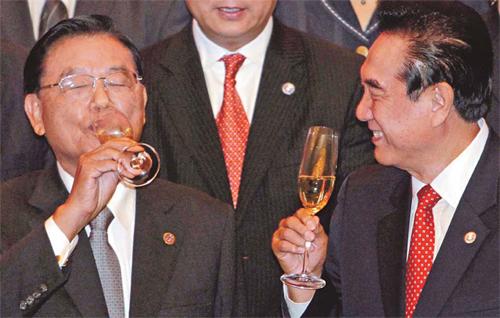
Chen Yunlin (right), chairman of the mainland's Association for Relations Across the Taiwan Straits, toasts with Taiwan's Straits Exchange Foundation Chairman Chiang Pin-kung during the signing ceremony of a cross-Straits trade deal in Chongqing Tuesday, June 29, 2010. [Agencies]
The deal, focusing on tariff concession and easier market access, will remove tariffs within two years on 539 Taiwan export items to the mainland worth $13.84 billion as well as 267 mainland export items to Taiwan valued at $2.86 billion.
The pact will also give Taiwan firms access to 11 service sectors on the mainland, including banking, accounting, insurance and hospitals.
Taiwan industries including petrochemical, auto parts and financial firms will be the first to benefit from this deal, together with mainland raw material producers and service sectors like film and computer services, in tariff reduction and market openness.
Negotiators inked the deal in Chongqing, which was the country's wartime capital during the War of Resistance against Japanese Aggression from 1937 to 1945.
Zheng Lizhong, vice-chairman of the Beijing-based Association for Relations Across the Taiwan Straits (ARATS), said the talks over the trade pact, namely the Economic Cooperation Framework Agreement (ECFA), is the "most difficult issue" since the mainland and Taiwan restarted semi-official talks in June 2008, after Taiwan leader Ma Ying-jeou of the KMT came to power in May that year.
"It (ECFA) is an unprecedented, wide-ranging, complicated and tough topic. It will inject great momentum in cross-Straits ties," he said.
"This is a critical moment in the development of long-term relations. We should seize the opportunity to work together and build mutual trust," Chiang Pin-kung, chairman of Taiwan's semi-official Straits Exchange Foundation (SEF), said ahead of the signing.
His Beijing counterpart, Chen Yunlin, chairman of ARATS, called it an agreement of "equal consultation and mutual benefits".
The pact, signed to normalize cross-Straits economic relations, will boost bilateral trade already totaling about $110 billion a year - made up of some $80 billion in goods flowing to the mainland and $30 billion to Taiwan. Follow-up consultations will be held by both sides later to remove the obstacles for economic and trade activities.
Analysts from the Peterson Institute for International Economics, a Washington think tank, project that the deal could help Taiwan increase its GDP by up to 5.3 percent by 2020, while the growth will only be 0.8 percent without the ECFA.
Taiwan leader Ma Ying-jeou hailed the ECFA as "another step toward peace and prosperity". He said the deal will expand cross-Straits trade and prevent Taiwan's economy from being marginalized.
"Cross-Straits peace has moved another step forward and is more solid," he said in Taipei on Tuesday before the signing of the deal.
The KMT has taken the ECFA as a great opportunity to boost the economy and consolidate its power base.
KMT Secretary-General King Pu-tsung earlier said the signing of the ECFA will help KMT candidates win support in the year-end mayoral election in five major cities, which will directly decide the balance of power between the KMT and the opposition pro-independence Democratic Progressive Party (DPP).
Although the DPP is fiercely against the ECFA, recent opinion polls showed that the majority of Taiwan public support it and believe it will bring more good than harm.
Tsai Yu-cheng, chairman of Mobiletron Electronics, a Taiwan-based auto parts company with factories on the Chinese mainland, said: "With the signing of the ECFA, I no longer have to pay tariffs of up to 8 percent."
Zhang Guanhua, deputy director of the Institute of Taiwan Studies at the Chinese Academy of Social Sciences, said the ECFA will help Taiwan alleviate the pressure brought by the free trade deal signed between China and the Association of Southeast Asian Nations that became effective in January.
"Of course the ultimate goal of the ECFA is tariff concession in almost all products from both sides, but that will take time," he told China Daily.
"The pact will also lay a solid foundation for the peaceful development of cross-Straits relations."
Kwok Yun-kwong, an economist from the Hong Kong Baptist University, told Taiwan's Central News Agency the ECFA will definitely benefit Taiwan and help launch the island's products to the world via the mainland market.
The two sides also signed an agreement on intellectual property rights protection on Tuesday.
Chiang Pin-kung said that the next round of ARATS-SEF talks will be held in Taiwan in the second half of this year.
While both sides ruled out touching political issues in their next talks, negotiators are expected to reach an agreement on medical and health cooperation as well as a comprehensive investment protection agreement to support the ECFA.
Related News
Photos
More>>trade
- A standard locomotive drove into Zhongshan for the first time yesterday
- Volunteers securing power supply for Asian Games set off
- A world-class tourism carnival to be held in Zengcheng
- The President of the Russian Federation visits China
- Huangshan (Anhui) Chamber of Commerce officially established in Zhongshan





